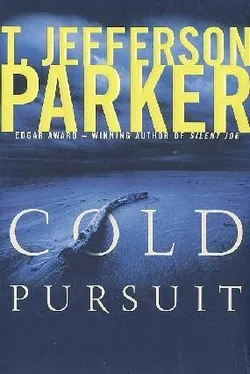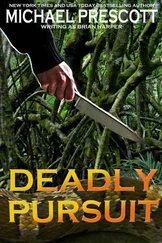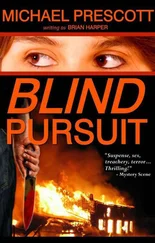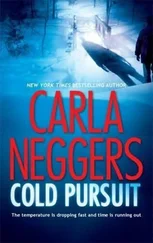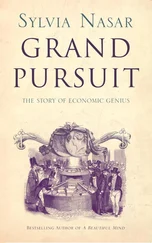A few minutes later a big red Mack came rumbling onto the drive, Axelgaard perched in the cab. The dealership floodlamps threw light at the truck and the shiny red paint threw it back. Smoke shot up from the gleaming chrome exhaust pipe. Victor collected his chips and player, climbed in.
As the tractor made the slow, lumbering turn onto the street, McMichael read the writing on the door: Pete Braga Ford/Let the Captain Take Care of You . The trailer carried three vans, two pickups and two Mustangs.
"Nice rig," said Hector. "Run you what, a hundred and twenty grand?"
"Pete was doing okay for himself."
McMichael drove, staying four, sometimes five or six cars back. Easy, tracking a red Mack loaded with new Fords. He fell back another few car lengths when they hit Interstate 5 south.
Through National City and Chula Vista, past Imperial Beach, then down into the border town of San Ysidro. By the time they hit Camino de la Plaza the retail signs were in English and Spanish- car insurance and currency exchange and parking. The houses and retail buildings were crowded together and even in the darkness McMichael could see their bright colors. The big Mack turned right on Virginia.
"He's going to the commercial gate," said Hector. "They'll stop everybody. U.S. might play ball with us, but the Mexican side is going to be tough."
McMichael looked out at the flashing yellow lights and the brightly lit U.S. Customs building, the zebra-striped barriers and orange pylons and the wall of concrete K-rails trailing off into Mexico. Two men in uniform stood in the door of the building. Four Customs and two San Ysidro Police cruisers waited along a chain-link fence topped with concertina wire. There were two southbound lanes open. McMichael watched Axelgaard and Victor take the right, so he took the left. Up ahead he saw a United States Customs agent reach up and take a clipboard from Axelgaard.
The big truck was still there when McMichael pulled forward. He shifted his body to the left, resting his right hand on the wheel, trying to look casual and keep his face and profile turned away from Victor, sitting up high, just a few yards away. He handed his badge holder to the inspector, who looked at him, then Hector. The Customs man handed back the holder and took Hector's. His nameplate said J. Alvarez.
"Business or pleasure?" he said.
"Business. We're working a burglary ring. Some Mexican nationals involved, maybe."
"Are you armed?"
"Service weapons, yes."
"You're supposed to have a warrant."
"We're not that far yet. This ought to go real smooth. We're just watching." McMichael patted the binoculars on the seat between him and Hector.
The inspector looked over at the truck again, then leaned in and gave Hector his badge and holder.
"Stay cool," he said. "And use the passenger vehicle lanes next time. I don't want to see you here again without some paper."
"Thanks. Cool it is."
The Mack rolled forward with a guttural snarl and a belch of white smoke and McMichael steered the Crown Victoria toward the Mexican Customs booth.
It was larger and busier than the U.S. version, three lanes leading into a low pavilion with clusters of floodlights bathing the street white. The Mexican flag lifted slightly, then fell in the cool air, Quetzalcoatl and the snake locked in a slow-motion struggle. Federales with machine guns stood in groups of four- they looked like Indians from the provinces, hard-eyed sixteen-year-olds, lean and watchful.
The Customs officials were working in teams- two for the interview and two to circle the vehicle. One of each team had a mirror on wheels with a long handle. Both carried carbines on straps over their shoulders.
"Guns," said Hector. "The only thing they don't want in this country is guns."
The timing got iffy. Axelgaard and Victor made the checkpoint faster than McMichael had hoped. He had just pulled into the inspection zone when he heard the Mack engine accelerate. He figured a hundred-yard lead into TJ and they'd loose them.
"Buenos noches," he said, offering his badge. "Policia de Ciudad San Diego."
They were here on business, McMichael explained in his passable Spanish.
The inspector said nothing. Didn't take the badge holder. The inspector behind him glared past McMichael at Hector. Another pushed his mirror under the front end and frowned into the reflection.
The first inspector looked over at the red truck, then took McMichael's badge. "Open the trunk."
McMichael pulled the latch, saw the trunk rise in the rearview. He could hear the wheels of the mirror as they rolled along Hector's side of the Ford. Voices, then the sound of his detective's case being set on the ground.
The inspector asked him if he was carrying weapons. McMichael told him they each had a sidearm, department-issue Smith & Wesson nine millimeters, no backups, no riot shotguns, no sniper rifles.
Ahead, he saw the red Mack pause into another gear, a puff of smoke rise from the light into the dark. The trunk slammed shut.
The inspector handed back McMichael's badge holder. He asked if they were working narcotics and McMichael said no, they were working a murder, a gringo in San Diego, a U.S. citizen, nothing to do with Mexico at all.
"Everything in Mexico has to do with Mexico," said the inspector.
He stepped away from the car and waved it forward.
Tijuana: cramped and loud, busses and trucks and ancient cars belching from red light to red light, cars fitted with rooftop loudspeakers blaring out advertisements, shop windows filled with shoes, windows of dresses, windows of meat and televisions and jewelry and perfume, the smell of smog and burning trash, of septic water and carnitas and diesel; traffic lights timed for congestion and frustration, hell-bent drivers with legal right-of-way, pedestrians sprinting for the curbs and jumping oily pools of rainwater thrown into sudden roostertail fans by the fabled Tijuana taxis.
"This place scares me to death," said Hector.
"That's why I drove."
McMichael, who had negotiated Tijuana as a southbound surfer during his high school and college years, had long ago learned to contribute to the chaos instead of trying to improve on it. He chirped the Crown Vic tires through a watery intersection to make a green, hooking a left turn just ahead of an oncoming city bus.
Eight minutes later he had double-parked on a crowded street off of Avenida Revolucion. He watched Axelgaard wrestle a series of tiny three-point turns to get the Mack and the cars through a chain-link gate manned by three young men. Two Doberman pinschers stood behind the gate in a pool of light, ears pointed skyward. The gate was the only opening in an eight-foot brick wall that ran the entire length of the block, then turned and disappeared into the darkness at the far side. It was topped with broken bottles, a thousand jagged edges in the dull city light. A billboard that stood behind the wall announced in English:
Diaz Leather Artists
Factory & Wholesale
Upholstery Welcome
When the back end of the trailer moved through, the men pushed the gate closed and locked three large chains. The dogs followed them from the light into the darkness.
***
An hour later the men opened the gates again and McMichael could see the big red tractor moving toward him in the darkness. Again, Axelgaard made three-point turns to get the long trailer past the walls. Once the rig was on Revolucion, McMichael kept well behind, following his way back to the commercial crossing.
This time he chose the same Customs lane as Axelgaard, but stayed three vehicles back. He wanted to see how it went for two gringos and a trailer load of new Fords. There were only six cars on the return trip, he noted: two minivans, three SUVs and a Mustang.
Читать дальше
